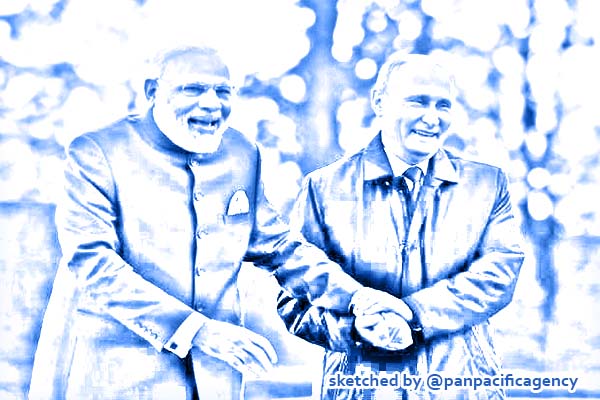[Analytics] Time for a Vladivostok Declaration?

Photo: Reuters. Sketched by the Pan Pacific Agency.
Russia’s strongman Vladimir Putin was swift enough, as usual, on the sidelines of the recently held SCO summit in Kyrgyzstan, to invite the newly elected prime minster of India, Mr Narendra Modi, as the “main guest“ at Russia’s Eastern Economic Forum (EEF)– an eventful economic platform held annually since 2015 for wooing international investment aimed at developing Russia’s far eastern regions. Nasir Muhammad specially for the Pakistan Today.
On the other hand, Pakistani Prime Minister Imran Khan, who was in Bishkek as well, was also reported by some local media houses to be attending the event in Russia in September on President Putin’s invite. However, this was reportedly disputed by the Russian side, which prompted Pakistan’s Foreign Office spokesperson to brush the news under the carpet by torpedoing the local media reports about the visit as “speculative,” instead of either confirming or denying the explanatory note from the Russian side.
If Khan fails to make it to Russia for the EEF, not only will it be an unambiguous diplomatic failure for Pakistan, but it will also be detrimental to the security and stability of South Asia.
We cannot deny the gospel that both India and Pakistan continue, since 1947, to live in an air of ceaseless distrust and disharmony, and that the two sides have been embroiled in three major conflicts and a number of crises so far. This has been exacerbated by both countries having large populations and being nuclear-armed: that means they also threaten the vital economic and geopolitical interests of other powerful countries such as China, Russian and even the USA.
The Russians must also convince their Indian partners that the key to durable peace and stability in South Asia lies in the resumption of meaningful dialogue between Pakistan and India, and in their unswerving promise towards peace and prosperity in the form of a new treaty, the Vladivostok Declaration.
The recent crises between the two rivals that erupted following the suicide bombing on the Indian side of the Kashmir valley in Pulwama, resulting in the killing of more than 40 Indian paramilitary forces- the highest in a single incident of terror in the Valley since 1989. The crisis saw a formation of nearly 12 Indian fighter jets piercing Pakistan’s airspace and bombing a thick Balakot area inside Pakistan’s KP province. Soon after this, Pakistan retaliated by shooting down two Indian fighter jets, ringing alarm bells among the comity of the nuclear capable countries on earth.
Although the situation has slightly cooled off since then, yet no one can figure out exactly what’s next in store for the two capricious South Asian rivals. The latter becomes more worrisome by the possibility of a third party (violent non-state actors) taking advantage of and exploiting the ensuing diplomatic gulf between Pakistan and India by carrying out terrorist attacks on Indian soil.
Such an environment of “nuclear uncertainty” in South Asia requires the need for the big powers, mentioned above, to timely step in and help convince the two sides to restart composite dialogue0 and move toward peace and tranquillity. The Russian Federation in this regard can play the role of a “big brother,” and for a good reason.
It was none other than the Russian Federation’s predecessor empire in the shape of the USSR that famously helped broker peace and maintained the status quo ante bellum, on 10 January 1966 after the war of 1965 between India and Pakistan, in the form of the Tashkent Declaration.
Although a cash-strapped Pakistan is not in a position to invest or even promise to invest billions of dollars in Russia at the present, the Pakistani diplomatic side must work to ensuring Khan’s symbolic participation in the upcoming EEF, so that there can be a trilateral summit with both India and Russia. The Russians must also convince their Indian partners that the key to durable peace and stability in South Asia lies in the resumption of meaningful dialogue between Pakistan and India, and in their unswerving promise towards peace and prosperity in the form of a new treaty, the Vladivostok Declaration.
Such a mediatory role by Russia also serves its undying national goal of projecting itself as a global power to counter the USA. President Putin has already tilted the balance of global policeman-ship towards Russia after his successful mission in Syria, in the Iranian Nuclear Deal, in Venezuela and recently in the Afghan peace process.
Pakistan will definitely benefit from such peace overtures as it will get the time and attention (away from India) to restructuring and revitalising its fledgling economy, diffusing the burgeoning domestic political tensions, and fostering mutually beneficial ties with its neighbours and the big powers.
As for India, stable ties with Pakistan will help improve its international image, stem further violence in Kashmir, possibly slow down the pace of secessionist movements in India and focus on the needs of its burgeoning population.
Nasir Muhammad is an M. Phil in IR and teaches at the Department of Political Science, University of Management and Technology, Lahore, Pakistan.